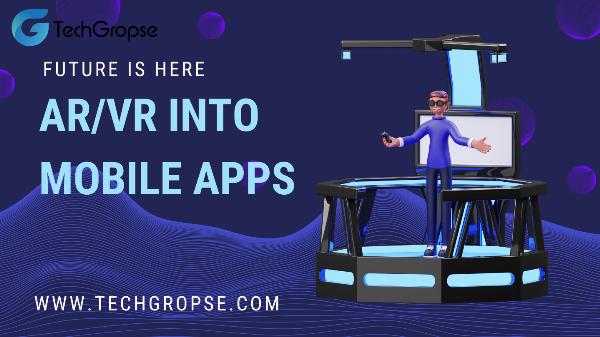The Future is Here: Integrating AR/VR into Mobile Apps

Strong 8k brings an ultra-HD IPTV experience to your living room and your pocket.
Augmented Reality (AR) and Virtual Reality (VR) technologies have revolutionized the way we interact with digital content. As these technologies continue to evolve, their integration into mobile apps is becoming increasingly prevalent, transforming various industries and enhancing user experiences.
This article explores the current landscape of VR in mobile app development in singapore, their potential applications, and the future prospects of these groundbreaking technologies.
The Rise of AR and VR in Mobile Apps
AR and VR have come a long way since their inception. AR overlays digital information onto the real world, enhancing the user’s perception of their surroundings. VR, on the other hand, immerses users in a completely virtual environment, offering a fully immersive experience.
The integration of AR in mobile apps has been facilitated by advancements in smartphone hardware, such as improved cameras, sensors, and processors, as well as the development of sophisticated software development kits (SDKs) like ARKit by Apple and ARCore by Google.
Current Applications of AR and VR in Mobile Apps
Gaming and Entertainment
Pokemon GO: One of the most notable examples of AR in mobile gaming, allowing players to catch virtual creatures in real-world locations.
Ingress: Another AR game by Niantic, where players interact with virtual portals in the physical world.
VR Gaming: Mobile VR headsets, such as Oculus Quest and Google Cardboard, have made immersive gaming experiences accessible to a broader audience.
Retail and E-commerce
IKEA Place: An app that uses AR to let users visualize how furniture would look in their homes before making a purchase.
Sephora Virtual Artist: Allows users to try on makeup virtually using AR, enhancing the online shopping experience.
Education and Training
Google Expeditions: An app that offers virtual field trips, allowing students to explore historical sites and natural wonders through VR.
AR Anatomy Apps: Medical students can use AR to study the human body in detail, overlaying anatomical structures onto a real-world model.
Real Estate
Zillow 3D Home: Utilizes VR to create virtual tours of properties, enabling potential buyers to explore homes remotely.
MagicPlan: An app that uses AR to create floor plans and 3D models of spaces.
Navigation and Tourism
Google Maps AR: Integrates AR to provide users with real-time navigation cues overlaid onto their surroundings.
City Guides: Apps like Detour offer immersive, location-based audio tours using AR.
Benefits of Integrating AR/VR into Mobile Apps
Enhanced User Experience
AR and VR provide more engaging and interactive experiences, making apps more enjoyable and memorable.
Improved Customer Engagement
AR and VR features can increase user interaction and retention rates by offering unique and immersive experiences.
Increased Sales and Conversion Rates
In retail, AR allows customers to visualize products in their environment, leading to more informed purchasing decisions and reduced return rates.
Remote Accessibility
VR enables users to experience places and events they might not be able to visit physically, broadening accessibility and inclusivity.
Challenges and Considerations
Technical Limitations
Despite advancements, mobile devices still have limitations in processing power, battery life, and display quality, which can affect AR and VR performance.
User Adoption
While AR and VR are gaining popularity, some users may be hesitant to adopt these technologies due to unfamiliarity or perceived complexity.
Development Costs
Creating high-quality AR and VR experiences can be costly and time-consuming, requiring specialized skills and resources.
Privacy and Security
AR and VR apps often require access to sensitive data, such as camera feeds and location information, raising concerns about user privacy and data security.
The Future of AR and VR in Mobile Apps
Advancements in Hardware
Future smartphones will likely feature more advanced AR and VR capabilities, with improved sensors, cameras, and processors enhancing the quality and realism of experiences.
5G Connectivity
The rollout of 5G networks will provide faster and more reliable internet connections, enabling more seamless and responsive AR and VR experiences.
Integration with AI and Machine Learning
Combining AR and VR with AI and machine learning will enable more sophisticated and personalized experiences, such as adaptive learning environments and smart virtual assistants.
Broader Industry Adoption
As AR and VR technologies mature, more industries will adopt these tools to enhance their services and operations. For instance, healthcare could see more advanced AR-assisted surgeries, and remote work could benefit from VR collaboration tools.
Increased Affordability
As the cost of AR and VR technology decreases, more developers will be able to integrate these features into their apps, leading to wider availability and adoption.
Final Word: The integration of AR and VR into mobile apps represents a significant leap forward in the evolution of digital experiences.
These technologies offer unprecedented opportunities for innovation across various industries, enhancing user engagement and providing new ways to interact with digital content.
While challenges remain, the future of AI mobile app development is bright, promising more immersive, interactive, and accessible experiences for users around the world. As hardware and software continue to advance, we can expect to see even more creative and impactful applications of AR and VR, truly bringing the future into the present.
Note: IndiBlogHub features both user-submitted and editorial content. We do not verify third-party contributions. Read our Disclaimer and Privacy Policyfor details.


